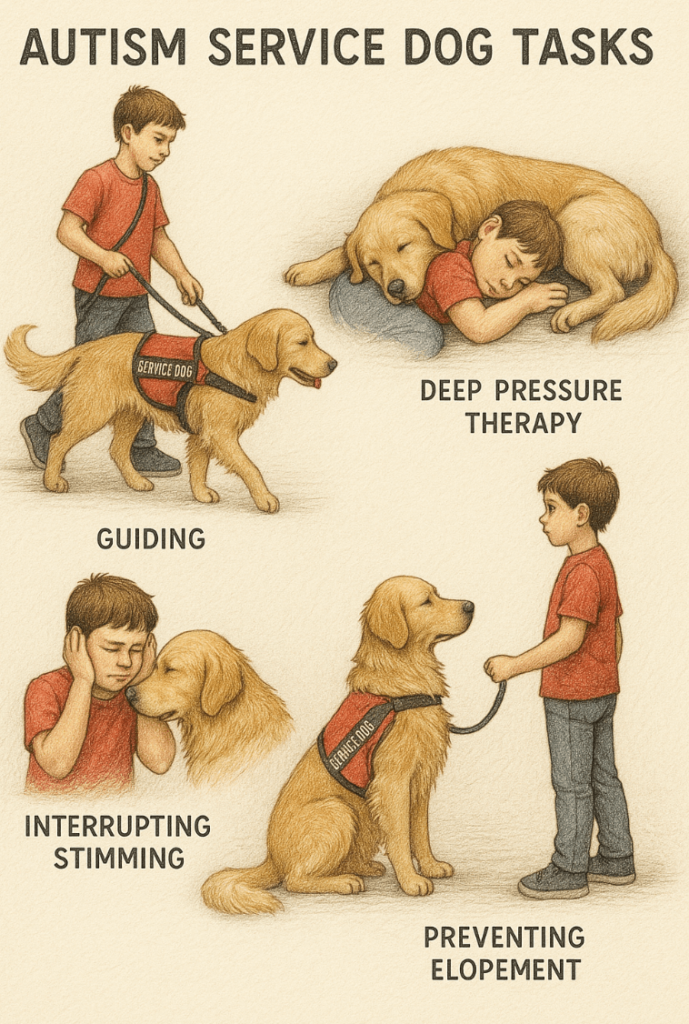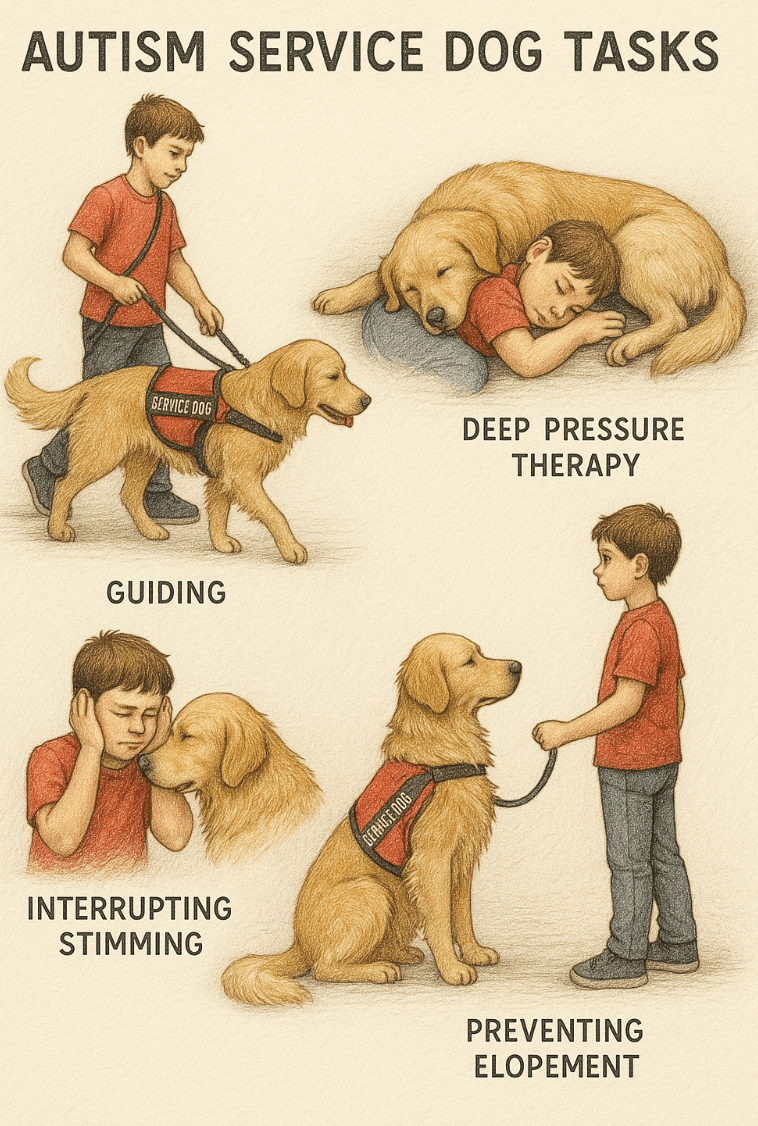Autism Service Dog Tasks: Transforming Lives with Canine Companionship
Autism service dogs play a vital role in enhancing the lives of individuals on the autism spectrum. These specially trained dogs are more than just pets—they are lifelines that provide emotional support, safety, and independence to their handlers. From mitigating sensory overload to assisting with daily tasks, these dogs are trained to perform specific duties tailored to the unique needs of people with autism.
In this blog post, we’ll explore the incredible range of tasks autism service dogs can perform, how they are trained, and the profound impact they have on families and communities. Whether you’re considering getting an autism service dog or simply curious about their capabilities, this guide will shed light on their invaluable contributions.
Core Tasks Performed by Autism Service Dogs
Autism service dogs are trained to perform a variety of tasks designed to support their handlers in navigating the challenges of autism. These tasks are carefully tailored to address specific needs, ensuring maximum effectiveness and comfort for the individual.
Deep Pressure Therapy:
Dogs apply gentle pressure by lying across the handler’s lap or chest, helping to calm anxiety or sensory overload during meltdowns.Interrupting Repetitive Behaviors:
By nudging or gently interrupting repetitive actions like hand-flapping, the dog helps redirect focus and reduce self-stimulatory behaviors.Providing Comfort During Overstimulation:
When overwhelmed by loud noises or crowded environments, the dog offers a calming presence to help ground the handler.Tracking and Locating:
If a child wanders off—a common concern among autistic individuals—the dog is trained to track and locate them quickly, ensuring their safety.Alerting to Triggers:
Dogs can sense changes in their handler’s emotional state or environment and alert them to potential triggers before they escalate.
These core tasks highlight the versatility and importance of autism service dogs in promoting independence and well-being for their handlers.
Training Process for Autism Service Dogs
The journey to becoming an autism service dog involves rigorous training that ensures they are equipped to handle the demands of their role. This process is both time-intensive and highly specialized.
Basic Obedience Training:
All service dogs start with foundational skills such as sit, stay, come, and heel to build discipline and responsiveness.Public Access Training:
Dogs learn to remain calm and focused in public settings, ignoring distractions like crowds, noise, or other animals.Task-Specific Training:
Each dog is taught specific tasks based on the needs of their future handler, such as deep pressure therapy or interrupting behaviors.Socialization Exercises:
Exposure to various environments, people, and situations helps the dog adapt confidently to real-world scenarios.Bonding with Their Handler:
Once paired, the dog undergoes additional training to strengthen the bond and ensure seamless teamwork with their handler.
Through this comprehensive training process, autism service dogs become reliable partners capable of transforming lives.
Check this guide 👉Autism Service Dog Training: Best 7 Expert Tips!
Check this guide 👉Signs of Autism in Dogs: Best 7 Expert Tips!
Check this guide 👉Best Dogs for Kids with Autism: Best 7 Health Tips!

Benefits of Autism Service Dogs | Challenges of Owning an Autism Service Dog |
|---|---|
Reduces anxiety and stress | Requires significant time investment for care |
Enhances safety through tracking abilities | Initial cost of acquiring/training the dog |
Promotes independence and confidence | Limited access rights in certain areas |
Provides companionship and emotional support | Potential behavioral issues if not properly trained |
Helps manage sensory overload | Regular vet visits and ongoing expenses |
How Autism Service Dogs Improve Daily Life
Beyond performing specific tasks, autism service dogs contribute significantly to improving the overall quality of life for their handlers and their families. Here’s how they make a difference.
Enhanced Safety Measures:
With their ability to track wandering children, these dogs provide peace of mind to parents concerned about their child’s safety.Emotional Stability:
The constant companionship of a service dog reduces feelings of loneliness and fosters emotional resilience.Increased Independence:
Handlers gain confidence in navigating public spaces and managing daily routines with the assistance of their dog.Improved Social Interactions:
The presence of a service dog often serves as a conversation starter, helping individuals with autism connect with others more easily.Reduced Caregiver Stress:
Families experience less stress knowing that the dog is there to assist and protect their loved one.
These benefits demonstrate why autism service dogs are cherished members of many households.
Signs You Might Benefit from an Autism Service Dog
Not everyone with autism requires a service dog, but certain signs indicate that one could be beneficial. Consider these factors when evaluating whether an autism service dog is right for you or your loved one.
Frequent Wandering Incidents:
If wandering or bolting is a recurring issue, a service dog trained in tracking can provide critical intervention.Difficulty Managing Meltdowns:
Individuals who frequently experience meltdowns may benefit from deep pressure therapy provided by the dog.Overwhelming Sensory Challenges:
Those struggling with sensory overload can find relief through the calming presence of a service dog.Need for Emotional Support:
A service dog can offer consistent companionship to combat feelings of isolation or anxiety.Desire for Greater Independence:
For individuals seeking to navigate life with more autonomy, a service dog can serve as a trusted partner.
Recognizing these signs can help determine whether an autism service dog aligns with your needs.
Misconceptions About Autism Service Dogs
Despite their growing popularity, several misconceptions surround autism service dogs. Clearing up these misunderstandings helps foster greater awareness and appreciation for their role.
They Are Just Pets:
Unlike regular pets, autism service dogs undergo extensive training to perform specific tasks that aid their handlers.Only Children Benefit from Them:
Adults with autism also benefit greatly from the support and independence these dogs provide.All Dogs Can Be Service Animals:
Not every breed or temperament is suited for the demanding responsibilities of a service dog.They Work Constantly Without Breaks:
Even service dogs need downtime to rest and recharge; overworking them can lead to burnout.They Solve All Autism-Related Challenges:
While incredibly helpful, service dogs complement—not replace—other forms of therapy and support.
Understanding these realities ensures realistic expectations and respect for the work these dogs do.
Choosing the Right Breed for an Autism Service Dog
Selecting the appropriate breed is crucial for ensuring success in pairing a dog with an autistic individual. Certain breeds excel due to their temperament, intelligence, and trainability.
Golden Retrievers:
Known for their friendly nature and eagerness to please, Golden Retrievers are a popular choice for service work.Labrador Retrievers:
Highly trainable and adaptable, Labradors are versatile dogs suited for a wide range of tasks.Standard Poodles:
Hypoallergenic and intelligent, Standard Poodles are ideal for individuals with allergies or sensitivities.German Shepherds:
With their protective instincts and loyalty, German Shepherds excel in safeguarding their handlers.Mixed Breeds:
Some organizations use mixed-breed dogs, which often combine desirable traits from multiple breeds.
Choosing the right breed sets the foundation for a successful partnership between the dog and their handler.
Tips for Caring for an Autism Service Dog
Proper care is essential to maintaining the health and effectiveness of an autism service dog. Follow these tips to ensure your canine companion thrives in their role.
Regular Veterinary Check-Ups:
Schedule routine visits to monitor the dog’s health and address any issues promptly.Balanced Nutrition:
Feed high-quality food tailored to the dog’s age, size, and activity level to maintain optimal health.Adequate Exercise:
Provide daily physical activity to keep the dog fit and mentally stimulated outside of their service duties.Mental Stimulation:
Use toys, puzzles, and games to engage the dog’s mind and prevent boredom.Consistent Reinforcement:
Continue practicing commands and reinforcing positive behaviors to ensure the dog remains sharp and responsive.
By prioritizing their well-being, you ensure your autism service dog remains a dependable and joyful partner for years to come.
Frequently Asked Questions About Autism Service Dogs
What qualifies someone to get an autism service dog?
Qualification criteria vary but typically include a diagnosis of autism and demonstrated need for assistance with specific tasks.
How much does it cost to get an autism service dog?
Costs range from $15,000 to $50,000 depending on the organization and level of training required.
Can I train my own autism service dog?
Yes, but it requires extensive knowledge, resources, and dedication to meet professional standards.
Are autism service dogs allowed in public places?
Yes, under laws like the Americans with Disabilities Act (ADA), they are granted access to most public spaces.
How long does it take to train an autism service dog?
Training usually takes 1-2 years, depending on the complexity of tasks and the dog’s progress.
The Lifelong Impact of Autism Service Dogs
Autism service dogs are more than just highly trained animals—they are compassionate companions who empower individuals with autism to lead fuller, safer, and more independent lives. Through their unwavering loyalty and specialized skills, these dogs bridge gaps, ease challenges, and create opportunities for growth and connection. While the journey to obtaining and caring for an autism service dog requires commitment, the rewards far outweigh the effort. For countless families and individuals, these remarkable dogs represent hope, freedom, and unconditional love—a testament to the power of the human-canine bond.
Do Cats Have Taste Buds? Best 7 Expert Tips! – Discover how cats experience flavors and why their taste is so unique.
Do Dogs Have Taste Buds? Best 7 Expert Tips! – Discover how dogs experience taste, their preferences, and what it means for their diet and health.
Can Cats Taste Sweet? Best 7 Expert Tips! – Discover why cats can’t taste sweetness, how it affects their diet, and tips to keep them healthy and happy.
Can Dogs Taste Sweet? Best 7 Expert Tips! – Discover how dogs perceive sweetness, which foods are safe, and tips to manage their sweet cravings responsibly.





